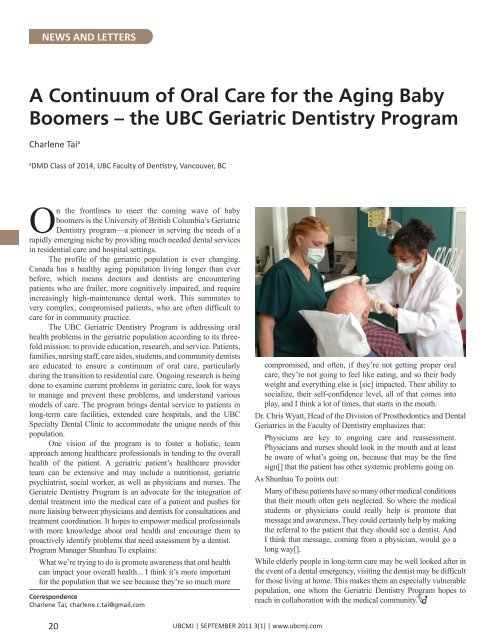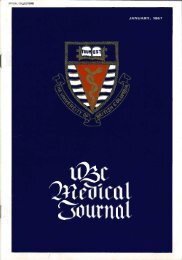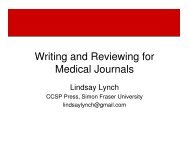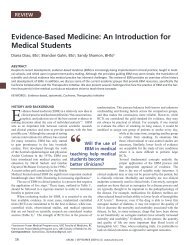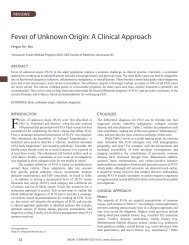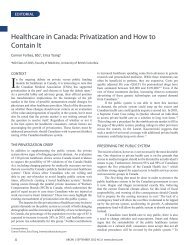Download full PDF - UBC Medical Journal
Download full PDF - UBC Medical Journal
Download full PDF - UBC Medical Journal
Create successful ePaper yourself
Turn your PDF publications into a flip-book with our unique Google optimized e-Paper software.
NEWS AND LETTERS<br />
A Continuum of Oral Care for the Aging Baby<br />
Boomers – the <strong>UBC</strong> Geriatric Dentistry Program<br />
Charlene Tai a<br />
a<br />
DMD Class of 2014, <strong>UBC</strong> Faculty of Dentistry, Vancouver, BC<br />
On the frontlines to meet the coming wave of baby<br />
boomers is the University of British Columbia’s Geriatric<br />
Dentistry program—a pioneer in serving the needs of a<br />
rapidly emerging niche by providing much needed dental services<br />
in residential care and hospital settings.<br />
The profile of the geriatric population is ever changing.<br />
Canada has a healthy aging population living longer than ever<br />
before, which means doctors and dentists are encountering<br />
patients who are frailer, more cognitively impaired, and require<br />
increasingly high-maintenance dental work. This summates to<br />
very complex, compromised patients, who are often difficult to<br />
care for in community practice.<br />
The <strong>UBC</strong> Geriatric Dentistry Program is addressing oral<br />
health problems in the geriatric population according to its threefold<br />
mission: to provide education, research, and service. Patients,<br />
families, nursing staff, care aides, students, and community dentists<br />
are educated to ensure a continuum of oral care, particularly<br />
during the transition to residential care. Ongoing research is being<br />
done to examine current problems in geriatric care, look for ways<br />
to manage and prevent these problems, and understand various<br />
models of care. The program brings dental service to patients in<br />
long-term care facilities, extended care hospitals, and the <strong>UBC</strong><br />
Specialty Dental Clinic to accommodate the unique needs of this<br />
population.<br />
One vision of the program is to foster a holistic, team<br />
approach among healthcare professionals in tending to the overall<br />
health of the patient. A geriatric patient’s healthcare provider<br />
team can be extensive and may include a nutritionist, geriatric<br />
psychiatrist, social worker, as well as physicians and nurses. The<br />
Geriatric Dentistry Program is an advocate for the integration of<br />
dental treatment into the medical care of a patient and pushes for<br />
more liaising between physicians and dentists for consultations and<br />
treatment coordination. It hopes to empower medical professionals<br />
with more knowledge about oral health and encourage them to<br />
proactively identify problems that need assessment by a dentist.<br />
Program Manager Shunhau To explains:<br />
What we’re trying to do is promote awareness that oral health<br />
can impact your overall health... I think it’s more important<br />
for the population that we see because they’re so much more<br />
Correspondence<br />
Charlene Tai, charlene.c.tai@gmail.com<br />
compromised, and often, if they’re not getting proper oral<br />
care, they’re not going to feel like eating, and so their body<br />
weight and everything else is [sic] impacted. Their ability to<br />
socialize, their self-confidence level, all of that comes into<br />
play, and I think a lot of times, that starts in the mouth.<br />
Dr. Chris Wyatt, Head of the Division of Prosthodontics and Dental<br />
Geriatrics in the Faculty of Dentistry emphasizes that:<br />
Physicians are key to ongoing care and reassessment.<br />
Physicians and nurses should look in the mouth and at least<br />
be aware of what’s going on, because that may be the first<br />
sign[] that the patient has other systemic problems going on.<br />
As Shunhau To points out:<br />
Many of these patients have so many other medical conditions<br />
that their mouth often gets neglected. So where the medical<br />
students or physicians could really help is promote that<br />
message and awareness. They could certainly help by making<br />
the referral to the patient that they should see a dentist. And<br />
I think that message, coming from a physician, would go a<br />
long way[].<br />
While elderly people in long-term care may be well looked after in<br />
the event of a dental emergency, visiting the dentist may be difficult<br />
for those living at home. This makes them an especially vulnerable<br />
population, one whom the Geriatric Dentistry Program hopes to<br />
reach in collaboration with the medical community.<br />
20<br />
<strong>UBC</strong>MJ | SEPTEMBER 2011 3(1) | www.ubcmj.com


